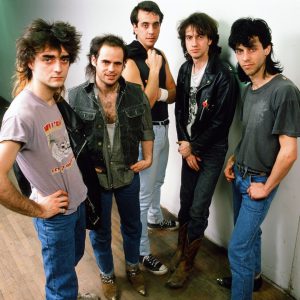The famous bell frantically ringing at the beginning of the song. The harmonica that makes you jump up from your seat. The simple melody that makes it a moment of eternity distilled into 3 minutes and 59 seconds. Rudy Caya and Claude Samson were kind enough to share their memories of the song’s inspiration and creation. “Le Train” was made a SOCAN Classic in 2013 for its numerous radio plays.
“The song was inspired by a friend’s father,” says Caya who grew up in Laval, Québec. He was what we call a patenteux (a tinkerer), a free spirit with a lot of imagination, but who was trapped in his own life as a worker and provider for his family of five children, hence this visceral need to embrace another life and feed his true passion.”
As the song says, “Parce qu’on passe à travers sa vie à coups de journées / La seule chose qu’on veut garder c’est l’droit de rêver.” (“Because we go through life one hard day at a time / The only thing we won’t let go of is our right to dream”). Proletarian lyrics of escapism, their affiliation with the style of Bruce Springsteen’s Born to Run or large swaths of Richard Séguin’s repertoire is obvious. “Un jour je vais sauter sur un train / Disparaître au bout du chemin” (“One day I’ll hop on a train / And disappear at the end of the road”).
“Rudy came to us with three guitar chords,” Samson remembers. “We recorded “Le Train” very quickly, spontaneously, we didn’t want to over-think it. The song is in the key of G, and the harmonica is in G as well, which should have been a lower key, but it was the only harmonica we had.”
As a result, this harmonica line is contagious; there is no defense against it. “Onstage,” says Samson, “as soon my harmonica sounded off-key, I’d throw it into the crowd and pull another one out of my pocket. On several occasions, people had their eyes on Rudy, and I’m pretty sure a few of them got one in the face!”
The song was recorded at Studio Victor in Montréal’s Saint-Henri district under the watchful eye of guitarist Rick Haworth. He assisted the five beginners, and worked out the arrangements, which were later produced by Glen Robinson – who mixed the album at the famous Morin-Heights Studio (Bowie, The Police, Bee Gees, Rush), which was no longer the property of its founder André Perry. Vilain Pingouin exploded on the scene in 1990 with “Salut Salaud,” “Marche seul,” “Sous la pluie,” and other festive hits, like “Le Train.”
Drinking rock? “Exactly!” says Samson. “I liked The Pogues at that time, and you can feel the influence on this first record. Some people even thought that the song ‘Du Rhum des Femmes,’ by the French band Soldat Louis, was ours! It’s true that we had mandolin and accordion in our instrumentation during this session. ‘Le Train’ is a mix of country-rock, punk, and chanson française. We listened to Steve Earle a lot back then.”
Vilain Pingouin reached great heights, with a first album that received many nominations at the Gala de l’ADISQ, as well as the Félix for Group of the Year in 1991. The song was co-written by Rudy Caya, formerly of Les Taches, drummer Michel Vaillancourt, Claude Samson (on guitars and harmonica), multi-instrumentalist Rodolphe Fortier, Frédérick Bonicard, and Nicole Beausoleil, now no longer in the group.
 All the tracks were recorded separately. “Audiogram [the record label] was very much in charge, which was a good thing, because together we sounded like a garage band,” says Caya. “We all had $12-an-hour, 40-hours-a-week, day jobs. To us, Vilain Pingouin was a band of buddies,” he says.
All the tracks were recorded separately. “Audiogram [the record label] was very much in charge, which was a good thing, because together we sounded like a garage band,” says Caya. “We all had $12-an-hour, 40-hours-a-week, day jobs. To us, Vilain Pingouin was a band of buddies,” he says.
“The famous bell,” says Caya, “was stolen from a gym by Michel, and he used it as an ashtray!” Samson admits it with a laugh. “He’d set it up on his hi-hat, and was inspired by the song “Oowatanite” by the Canadian rock band April Wine. To this day, ‘Le train’ is still our closer when we play live.”
“There are a few cover versions of the song on YouTube, but they all fall flat,” says Caya. “There’s no easier song to play, but they try to sing it. I’m not a singer, but a performer. My flow is closer to spoken word. When you have so many lyrics to unpack at such a pace, you don’t stay on the note for long!”
The band is one of the song’s publishers, and the piece has evolved over time. On VP’s fourth album, Jeux de mains (2003), listeners were delighted to hear a new version of “LeTrain,” renamed “TGV!” (A reference to the France’s Train Grand Vitesse.)
“Our audience has made ‘Le Train’ its own, more than our other songs,” says Caya. “When people ask me if I’m sick of playing it, basically you’re excited the first five times you play it in a band, you’re proud of yourself the first 20 times you play it in a show. After that? Well, it’s the song on which so many have anchored their memories of the band!”
Vilain Pingouin, still going strong, and will re-issue Roche et Roule (1992) on vinyl in 2021.